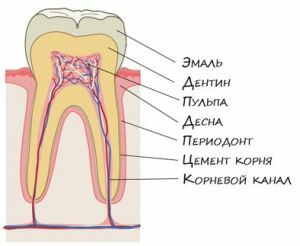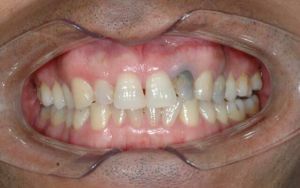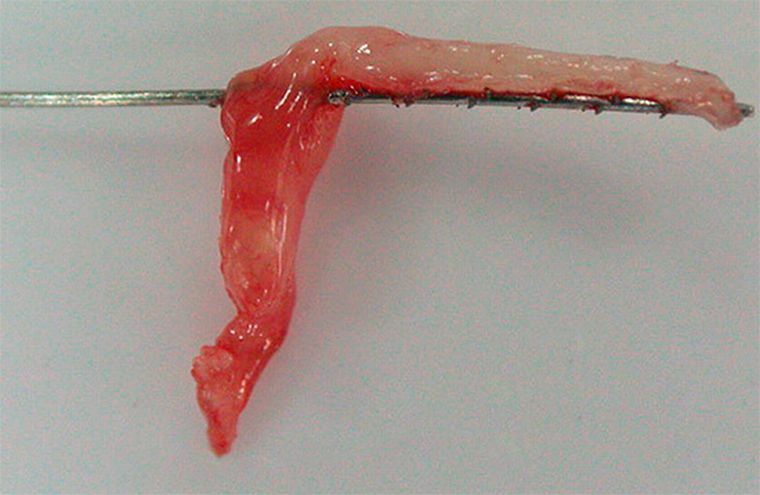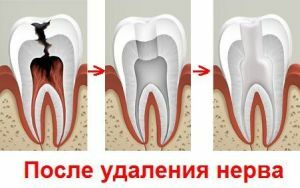 Some people think that the tooth is just a bone, forgetting that in addition to what you see in the mirror, there is also a so-called pulp - a peculiar weave of nerve endings and blood vessels.
Some people think that the tooth is just a bone, forgetting that in addition to what you see in the mirror, there is also a so-called pulp - a peculiar weave of nerve endings and blood vessels.
It is the pulp that is usually called the nerve( although there may be three nerves in it - their number equals the number of tooth roots), and it is sometimes better to remove it.
Contents
- Why do you need this painful spine?
- When is the deletion necessary?
- How long will the tooth last without a nerve?
- Why does it hurt so much?
- Is it a joke to tear the nerve out yourself?
- Use of anesthesia - a necessity or not?
- There is no nerve, but it hurts. ..
- It hurts day and night, on a full stomach and on an empty stomach
- What do we have in the end?
Why do you need this painful spine?
An uneducated person may think that the nerve is an absolutely useless part of the tooth, but in fact a lot depends on it. It is the  due to the nerve that a person's tooth can react to external stimuli( for example, to cold, heat or too sweet water).
due to the nerve that a person's tooth can react to external stimuli( for example, to cold, heat or too sweet water).
After the removal of the pulp, the blood supply to the tooth is interrupted, the mineralization also stops, which makes the strength of the tooth noticeably reduced.
It is faster destroyed, the chances of breaking it up are about the usual food. Often such teeth quickly darken - for appearance they are called "dead."
When is the deletion necessary?
Prospects after nerve removal are rather gloomy - why do doctors sometimes strongly recommend removing it as soon as possible, closing the resulting hole with a seal? Let's figure it out.
Step by step to the depopulation:
- It all starts with the banal caries .At the very beginning of the process, only the outer part of the tooth - the dentin tissue - is destroyed. The nerve is not touched at all, so the dentist( with timely access to him for help) has the option of leaving the tooth as is, closing the destroyed part with a simple seal.
- If the tooth is destroyed thoroughly and the inflammation of the pulp( pulpit ) begins, the doctor should make a decision: to leave some part of it or delete completely.
- If the tooth is completely started, and the periodontitis has started, there are no options - the pulp is removed completely, and the tooth goes to the "dead" position.
In addition to the above situations, too large tooth damage can serve as a signal for amputation of the dental nerve. If there is too much caries on it, or if the crown is completely destroyed, the variant with preservation of the dental nerve is not considered.
 The same can be said about patients with sharp and prolonged pain.
The same can be said about patients with sharp and prolonged pain.
There are cases in which pulpitis begins on an externally fully healthy tooth.
In fact, such a tooth can not be called healthy - stones or, as they are called, "stones", which can sometimes be seen in the root canals, can squeeze the nerve, which leads to irritation, and then to inflammation. In this case, the nerve should be removed as soon as possible, not paying attention to the fact that apparently everything is in order.
How long will the tooth last without a nerve?
In any case, removing the nerve from the tooth is a forced procedure. No doctor will tell you to perform such an operation without a weighty

. In the photo, a dead tooth without a nerve
causes. It's not just the darkening of the enamel or the loss of sensitivity - these teeth live much less than healthy ones.
If the canals are treated as it should, and the seal was put by a professional, the tooth can last from one to ten years.
The term is long, but it still has to be repeated after the procedure, or, most likely, to restore the tooth by more cardinal methods - for example, a crown.
Why does it hurt so much?
The dental nerve or pulp is an interlacing of blood vessels and nerve endings.
In addition to the large nerves in the roots, there are many small processes entangled in a tight tangle - with the irritation of this tangle, a great pain begins, which signals that enamel and dentin are destroyed, so it's time to start treating the started tooth.
Is it a joke - to tear the nerve out yourself?
To some, this part of the article may seem silly, but, unfortunately, there are people who really tried to conduct this complex operation without the help of doctors. Of course, nothing good came of it - at the very best, a person simply got into the dentist's chair to re-clean the channel, at worst - lost a tooth and received a serious inflammation with severe pain.
So, if the dentist said that you can not do without removal, do not go for garlic, various acids and hot needles - the dentist will do everything much faster, more efficiently, and, most importantly, painless.

In the photo, the nerve of the tooth is repeatedly enlarged under the microscope
. Is the use of anesthesia necessary or not?
There is another type of people - those who are afraid of nerve removal so much that they are willing to pay huge money for the operation under general anesthesia.
This is completely unnecessary: modern methods allow you to deal with the dental nerve as quickly and painlessly as possible - you will not spend more than an hour in the dentist's chair.
Yes, it may look a little uncomfortable, but believe me, it's better to survive a little stress because of the unpleasant sounds of scraping with tools on the tooth, than getting a shock dose of drugs immersing in medication sleep.
No nerves, but it hurts. ..
Unfortunately, even modern medicine can not always solve the problem right away. If you have removed the nerve of the tooth, the pain may return - and, of course, the  is not always a normal phenomenon.
is not always a normal phenomenon.
The first outbreaks of pain returned can occur almost immediately after anesthesia has passed. The sensitivity of the oral cavity rises, the general well-being of a person can seriously worsen.
This is a normal reaction to, in fact, a surgical intervention - you have about two days to recover. If you do not tolerate pain, you can take an anesthetic pill( before doing this, it is better to consult a doctor - do this before removing the nerve or immediately after the procedure).
It hurts day and night, on a full stomach and on an empty stomach
The most common cause is poor-quality treatment. If the dentist is distracted, did not completely disinfect the channels or left a very small cavity inside - the tooth with a high probability will start to hurt again.
How to avoid this situation? To address to the checked up experts who can prove the qualification and have enough positive responses from other patients( in an ideal - your friends).
This is what the damage to the dental instrument in the tooth cavity can lead to:
 Another reason is allergy. Yes, it happens and such. Especially if this is the first such procedure in your entire life. The most common symptoms are mucosal edema, temperature, rash, and even rejection of the filling.
Another reason is allergy. Yes, it happens and such. Especially if this is the first such procedure in your entire life. The most common symptoms are mucosal edema, temperature, rash, and even rejection of the filling.
Treatment in this case is standard - the seal is removed, medications are prescribed against allergies, after which the doctor installs a seal from another material.
Among other things, you can take pain in the neighboring teeth for pain in the depulled tooth. This is a fairly common misconception, especially if the teeth are tight enough. To understand the situation can often only the dentist.
What do we have in the end?
To remove a dental nerve simply so in no event it is impossible. It is necessary to consult a doctor, ask about possible risks and opportunities, and only then make a decision.
Of course, to keep the nerve, which has become so inflamed that it is impossible to chew on half of the jaw, it is better not to have one "dead" tooth than to deal with serious problems affecting the oral cavity as a whole.
